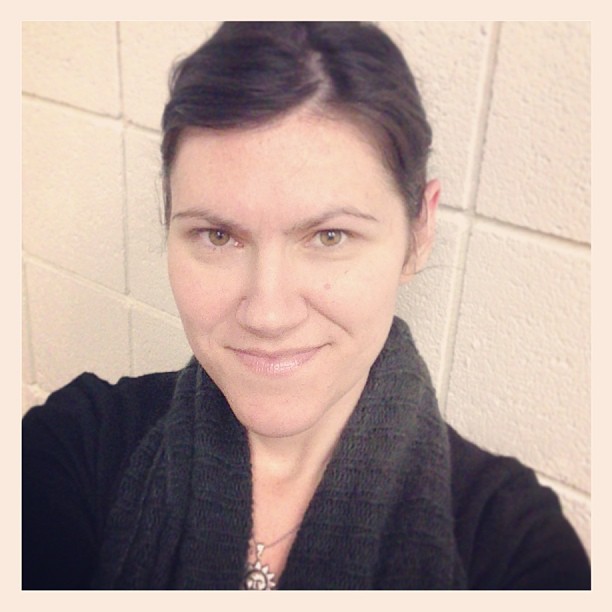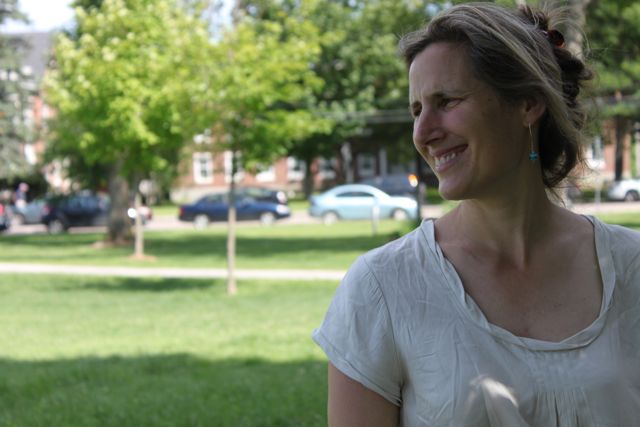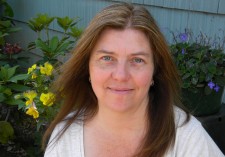Loquacious: "Feral" by Kimberley McGill
 Wednesday, April 3, 2013 at 9:53PM
Wednesday, April 3, 2013 at 9:53PM Loquacious: full of excessive talk : wordy (www.m-w.com)
Loquacious is a "wordy" series that revels in language. Read more essays in the series here.
I've had the pleasure of knowing Kimberley McGill for several years now. Though we've never met in person, I feel confident that we could sit down to tea together and chat for hours about books, travel, spirituality, and cats. I think I first made Kimberley's acquaintances when she was a student in one of my Alchemy writing classes, and I got to know her better when she became one of my writing coaching clients. It's been a joy to see her transition from being rather tentative about her writing ability to owning it. Her perspective is always interesting and often a bit unusual -- which is just the kind of perspective I like to encounter in people and on the page.
Feral
By Kimberley McGill
Growing up, I memorized the rules of civilized behavior – how to look, dress, walk, think, and feel. I learned to bend to the mandates of schools, media, and my abusive parents. Politely and quietly, I surrendered while simultaneously applying my lipstick and mascara. Domesticated.
As an adult, I tried to hide the fact that I wrote poetry and wanted to speak the truth. I longed to satisfy my curiosity about the world and judge right and wrong for myself. Even though I could barely remember a time before I'd internalized all those rules, I wanted to ditch the suffocating masks. I dreamed of living as myself – going feral.
I respect feral animals. Humans try to domesticate them, yet they somehow find a way to escape and return to their natural state instead of remaining a disguised creature. They embody authenticity and resourcefulness.
It took a while, but I eventually slipped out of my disguise. The shift disoriented me, but I hung on and found, buried under layers of lies, a feral compass that pointed me toward emotional and physical health. Not everyone in my life celebrated with me. They could tolerate my bohemian look, they could even overlook my divorce, but all my crazy truth talk had to stop. When I kept talking some people disowned me, others chalked everything up to insanity, and still others gave me long, animated lectures on how selfish I had become and admonished me to stop making everyone's lives so stressful.
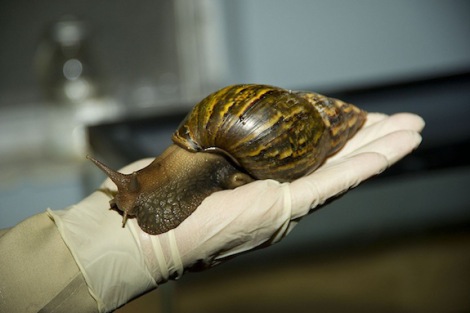
I felt like what I imagine the Giant African Snails would feel if they actually had brains. As it is, they creep along oblivious to the fact that people are upset with them. Somehow, humans transplanted them from their home in Africa and dumped them in Australia. A shipping accident might have brought them over, or maybe someone thought the snails would look cool at the bottom of those huge fish tanks that aquariums use. In any case, they got loose and now go about their business eating everything in their path, including houses. Seriously, they can chomp away at houses. So now Aussies call them an "invasive species," as if the snails had a big meet-up to plan an invasion of Australia. As I mentioned before, they don't actually have brains. But if they did, would they feel as angry and hurt as I did when people twisted my story to use as a weapon against me?
These days I don't have anyone in my life that treats me this way, but a few of the people who love me don't always understand me. When my daughter, Melissa, discovered that I titled my blog "Feral Compass," she texted me: "Mom, people will think you don't bathe or use eating utensils. Do you have to be strange? :)" She included the smiley face, not because she didn't mean what she wrote, but to let me know she loved me anyway.
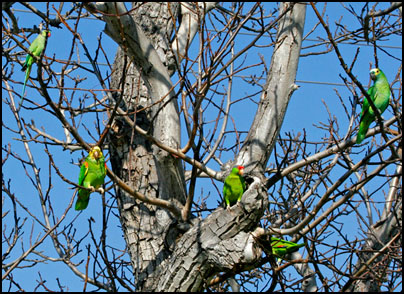
When Melissa came from Mississippi to visit us here in Southern California, I had to warn her about the feral parrots that live in our area. They're not dangerous, but at sunrise they come out of the trees squawking and screeching long before any sensible person's alarm clock goes off. Having our double-paned windows closed doesn't protect us from the piercing noise. Melissa brought earplugs and lovingly rolled her eyes when I told her that I love the birds.
Every morning I smile, even while I'm cussing them out, because I feel a kinship with these Amazonian Parrots. Our stories mirror each other – they were smuggled in with the intention of domesticating them into pets, but before that could happen they escaped to make a life for themselves as free birds. I'm in awe of the fact that their flocks aren't homogeneous – they include different species of Amazonian Parrots that wouldn't usually hang out together. I don't know how much of a brain they have, but they have figured out that they can thrive together. Of course, it helps in their relationship with humans that the little green screechers don't eat houses. They just make the windows rattle.
I've also found a diverse community, outside of family, to thrive in. A "tribe" made up of women from all over the map whose children also call them strange. Sometimes when we get together, we can make windows rattle, too.
I'll always think of myself as a feral human. I deconstructed the roadmap I'd lived with for more than half a lifetime and remade it to move closer to my values and my heart. The map has built-in flexibility for all the unexpected, and sometimes unwelcome, circumstances that show up. My feral choices heal and delight me and can also leave me feeling raw and vulnerable. They're the only choices I'm willing to make.
Oh, and in case my daughter's text message raised any concerns about my personal hygiene and table manners: I adore bubble baths and even know how to use chopsticks.
** ** **
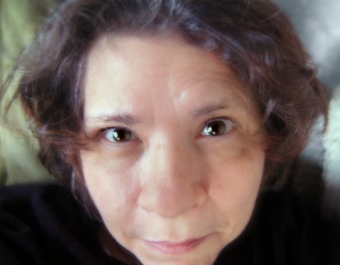 With roots in the American South and Argentina, Kimberley's feral compass has led her through South America, Europe, and a good assortment of back alleys. Currently she lives in Southern California with her sweet man and two mostly feral but spoiled cats. She's working on developing her blog (Feral Compass), revising her poetry, and wriitng a few true stories for a crazy and almost impossible project she dreamed up while riding the train from California to New Orleans last year. She won't allow anyone to trick her into revealing the details.
With roots in the American South and Argentina, Kimberley's feral compass has led her through South America, Europe, and a good assortment of back alleys. Currently she lives in Southern California with her sweet man and two mostly feral but spoiled cats. She's working on developing her blog (Feral Compass), revising her poetry, and wriitng a few true stories for a crazy and almost impossible project she dreamed up while riding the train from California to New Orleans last year. She won't allow anyone to trick her into revealing the details.
Image credits:
Snail: http://www.flickr.com/photos/usdagov/6947960770/
Parrots: United States Department of Agriculture, http://tiny.cc/l4fcuw
 loquacious
loquacious 


